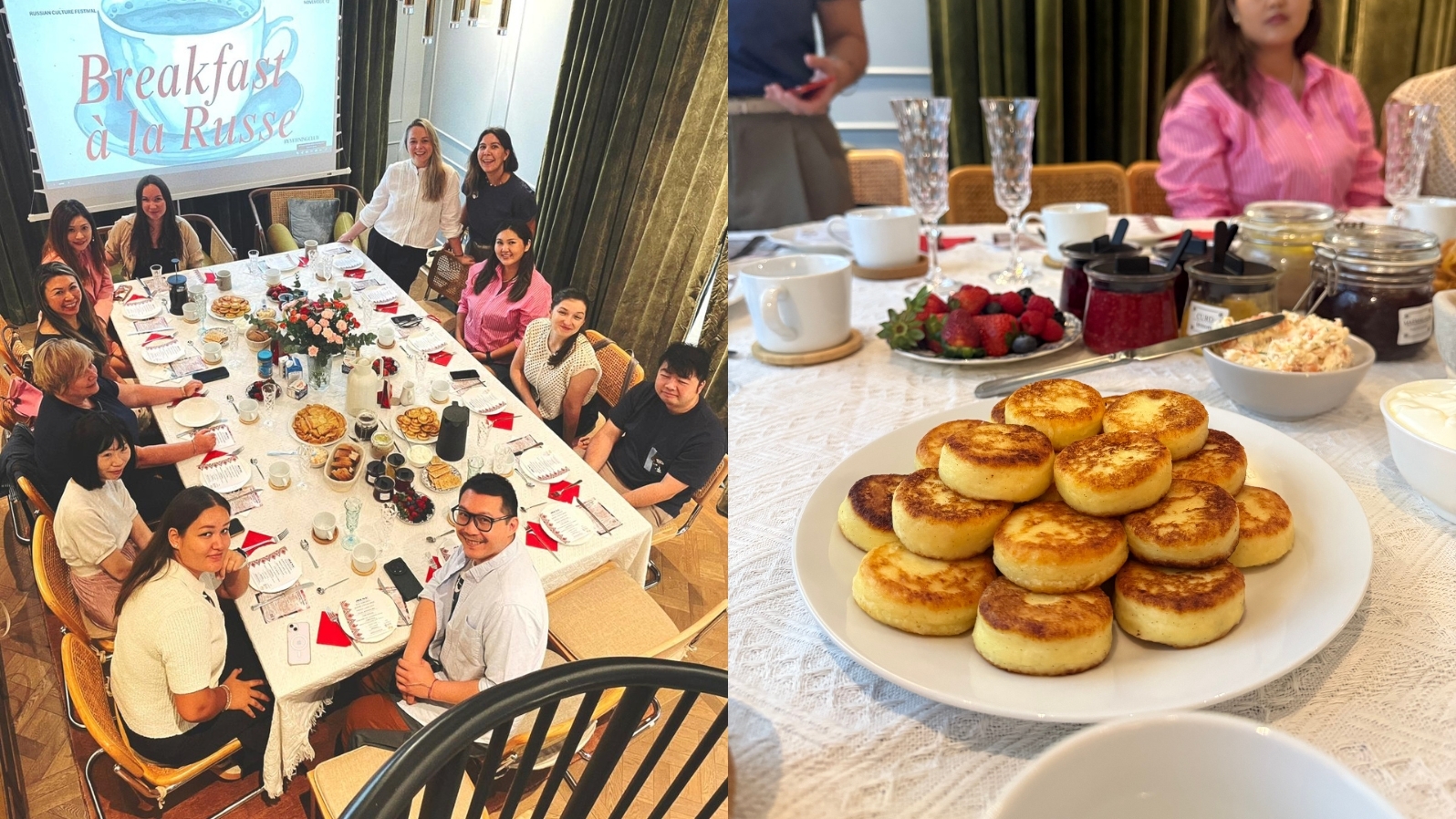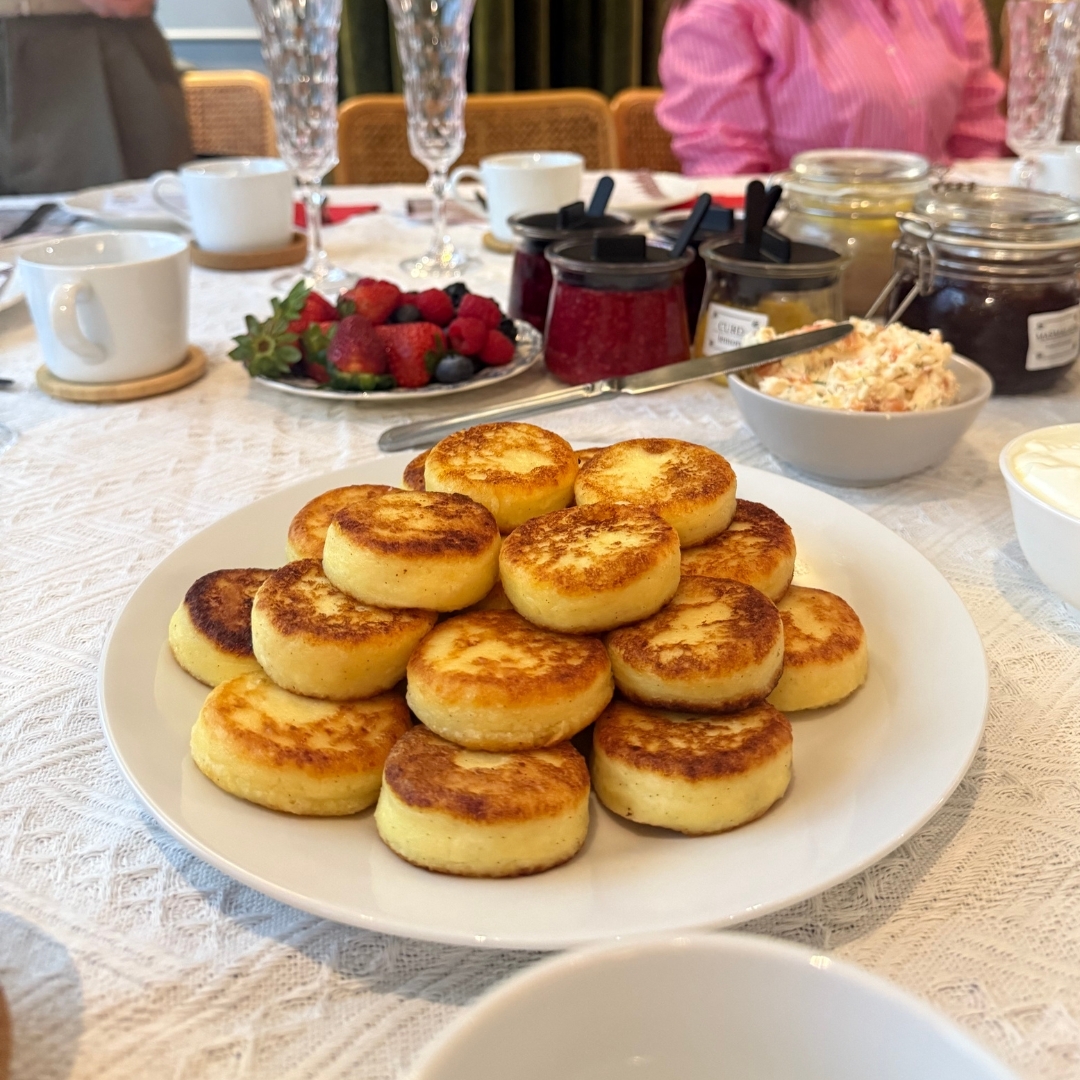
The Blini Diplomat: Russian Women Forging Ties With Hong Kong
Across the dining table, Soyolmaa Dashpuntsag spread a layer of homemade chicken liver pâté onto a warm blini, treating it like a canvas. She then added a swirl of bright raspberry jam alongside it. The combination on her plate was more than just a mix of flavors; it resonated with the tales of khans and tsars, stirring feelings of nostalgia and memories of her mother's Russian cooking.
"This chicken liver is new to me," she said as she turned to the keen-eyed Hong Kong locals at the table, "But the salmon, the sour cream, and the sweet jam… remind me of my childhood in Mongolia, where my mother spoke Russian and always made me Russian breakfasts when I was a kid." Soyolmaa fondly reminisced about the joy of sharing these experiences at the Morning Club.
The intimate table setting welcomed the locals into a culinary world that felt both familiar and intriguingly foreign. As the plates were passed around, the local guests faced a cuisine that remains vague, overshadowed by the stereotypes from the Cold War and clichés of extravagant, caviar-laden excess. A simple question emerged: What do Russians really eat for breakfast? At the heart of this revelation was Olga Suxareva, who was the host of the Morning Club, and was about to unveil a truth long hidden: domashnyaya yeda—the cherished taste of homemade food.
"Homemade recipes set the mood for breakfast," Suxareva explained. "The food should be not only delicious but also generous. 'Just like grandma made it!' Heartiness is paramount. Breakfast should provide energy for the entire day."
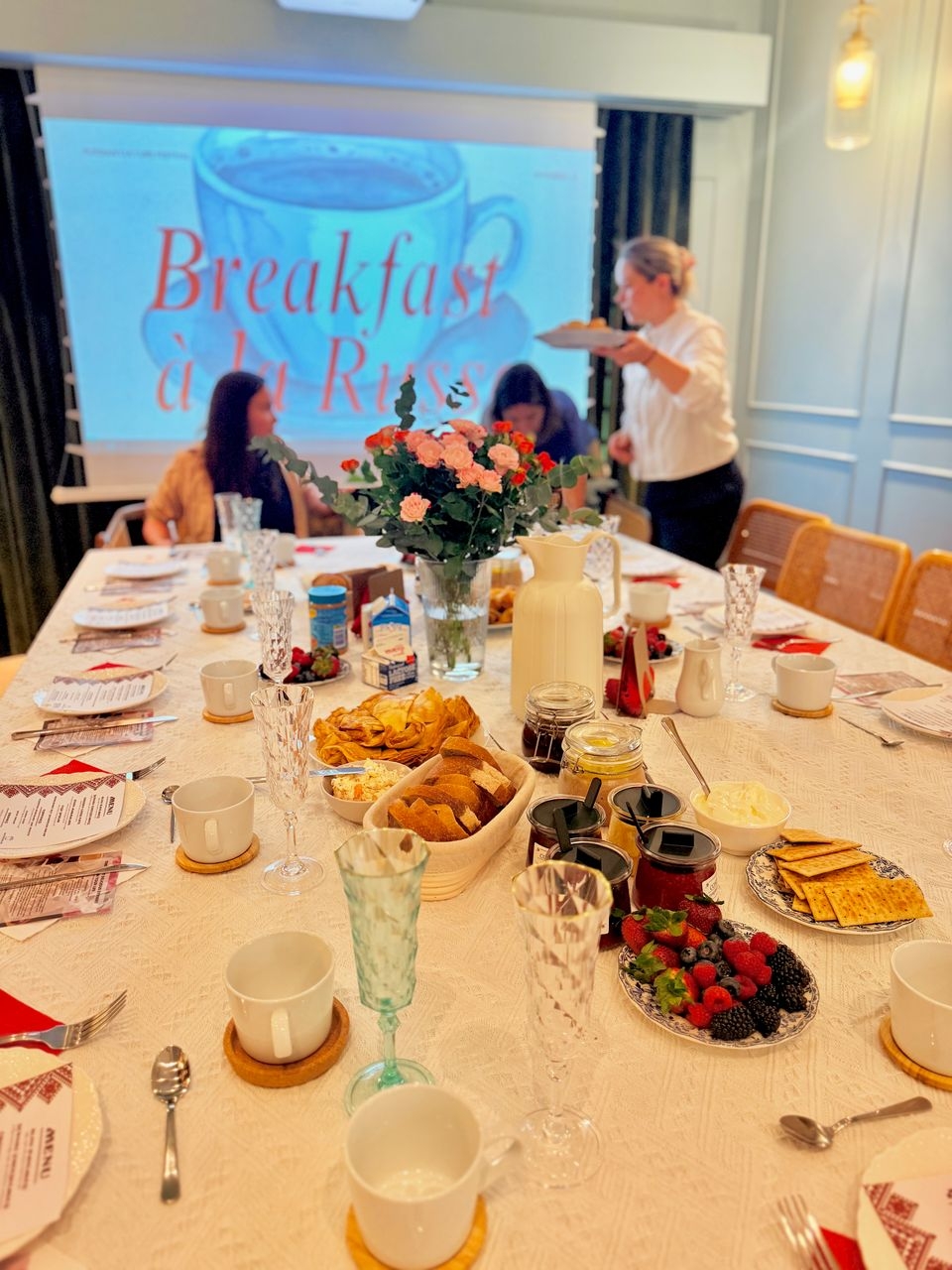
The traditional elements of a Russian breakfast include porridge (Kasha), bread, cottage cheese (tvorog), eggs, homemade jam, and pancakes or crêpes (blini, oladushki, and syrniki in Russian). They are the fuel to provide essential energy and nourishment to help combat the cold in Russia. In contrast, a typical breakfast in Hong Kong tends to avoid sweet and dairy foods.
Suxareva chose blini not only because they are delicious but also because they symbolize the sun. Crêpes are found in France, pancakes are popular in America, and jian bing (煎餅) is enjoyed in China. Blini originated as a Slavic dish and became an integral part of the Russian Orthodox tradition. They were sustained throughout the Soviet regimes in China, Mongolia, and Central Asia, eventually reaching Hong Kong during the Bolshevik Revolution.
The hearty simplicity of blini, the earthy flavor of pickled beets, and chicken liver pâté (known as pashtet or kurinyi pashtet in Russian) are common components of Russian breakfasts. In Soviet-era cuisine, many Russian families prepare blini fresh, often drizzled with sautéed onions, smoked salmon, and sour cream, and garnished with dill or chives, or served with wild berry jam (varenye). Chicken liver pâté is a homemade option that adds richness and protein to the morning meal. Unlike the French version made from duck liver, it is lower in fat and calories but rich in vitamins A and B.
Russian and Hong Kong Breakfast Similarities

With a mix of curiosity and hesitation, local fashion designer Abi Lau, who had collaborated with Suxareva in Runway Asia, was inspired by her handicrafts. As she drizzled a scoop of sour cream on her blini, she noted that the Breakfast Club fosters closer relations between Hong Kong and Russia through cultural exchanges. "Both cultures have a deep love for dumplings!" Lau observed.

ABI 25/26 COLLECTION “BREATHE WITH NATURE”
Cultural differences
Beyond food, Russian breakfasts provide an opportunity for connection and slow, thoughtful nourishment. They typically involve conversation, discussions about plans for the day, and multiple cups of tea. Meals are not hurried; instead, the atmosphere is filled with warmth and a sense of communal bonding. In contrast, breakfast in Hong Kong tends to be more functional, focusing on efficient fueling. Socializing often takes a backseat to the act of eating.
"Russian breakfasts are associated with caring for family, childhood memories, and a sense of security," Suxareva explained. "The uniqueness of the Russian breakfast lies in the harmony of tradition, flavor, heartiness, and family warmth, creating a special atmosphere to start the day."
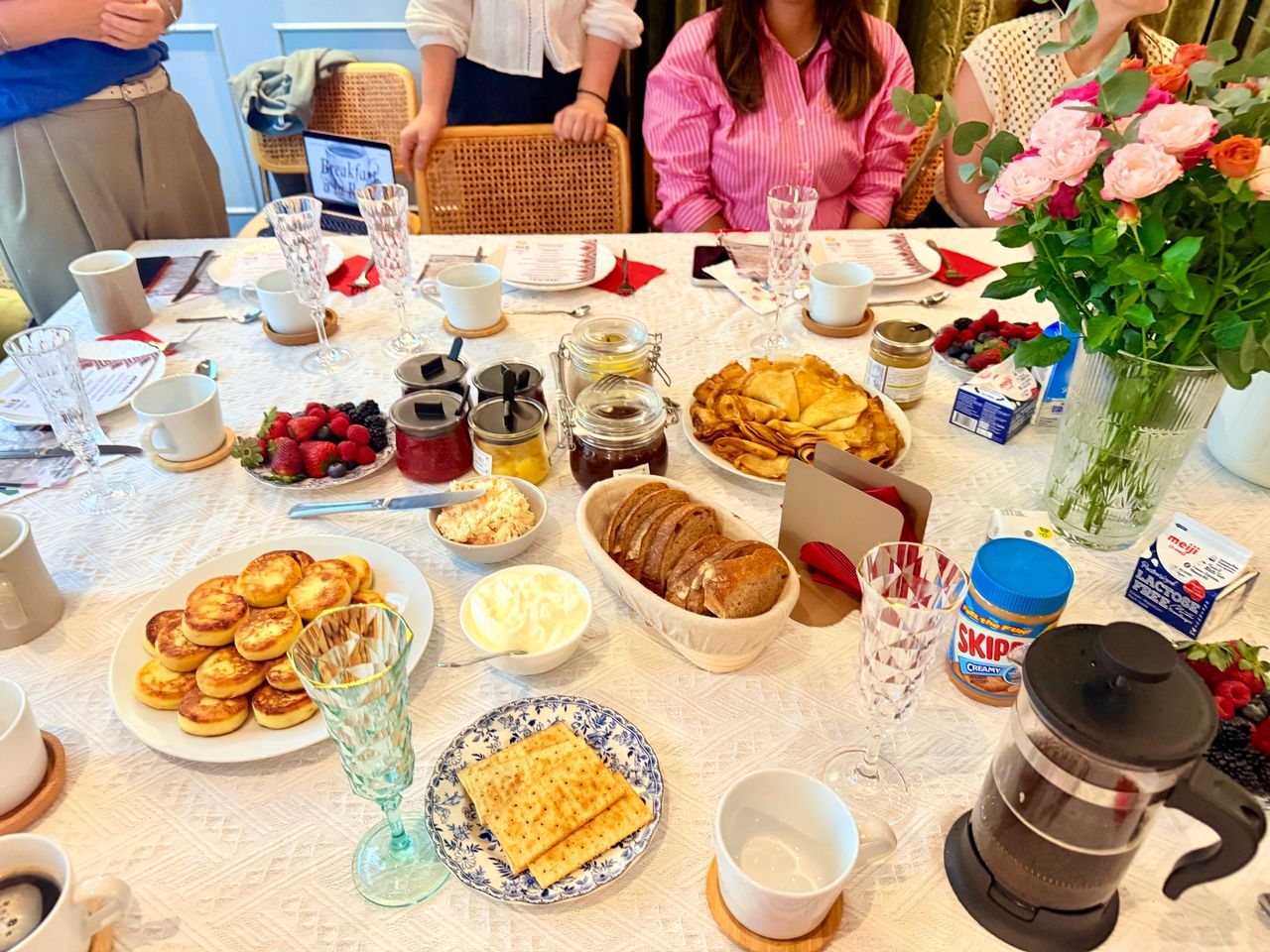
Born in Ussuriysk, a city in the far east of Russia bordering China, Suxareva moved to Hong Kong three years ago and established The Morning Club, also known as the Russian Breakfast Club. She doesn't just serve food; she offers a way for flavors to bridge cultural gaps. With deliberate care, she introduced her homemade Siberian-style breakfast to the locals, allowing them to taste the soul of a place often misunderstood.
For decades, Western media and Hollywood have portrayed Russian dining as consisting of glistening Beluga caviar on blini, accompanied by icy shots of Siberian vodka. "The truth is that black caviar is not particularly common due to the endangered status of the Beluga sturgeon," Irina Ustyugova, founder of The Russian Club, demystified.
According to Ustyugova, Russian cuisine embodies the warmth of the kitchen. It encompasses the realm of domashnyaya yeda (homemade food), where the authentic national dish is not caviar, but a steaming bowl of borscht made from a grandmother's recipe, or a stack of blini shared with friends as a simple act of hospitality.
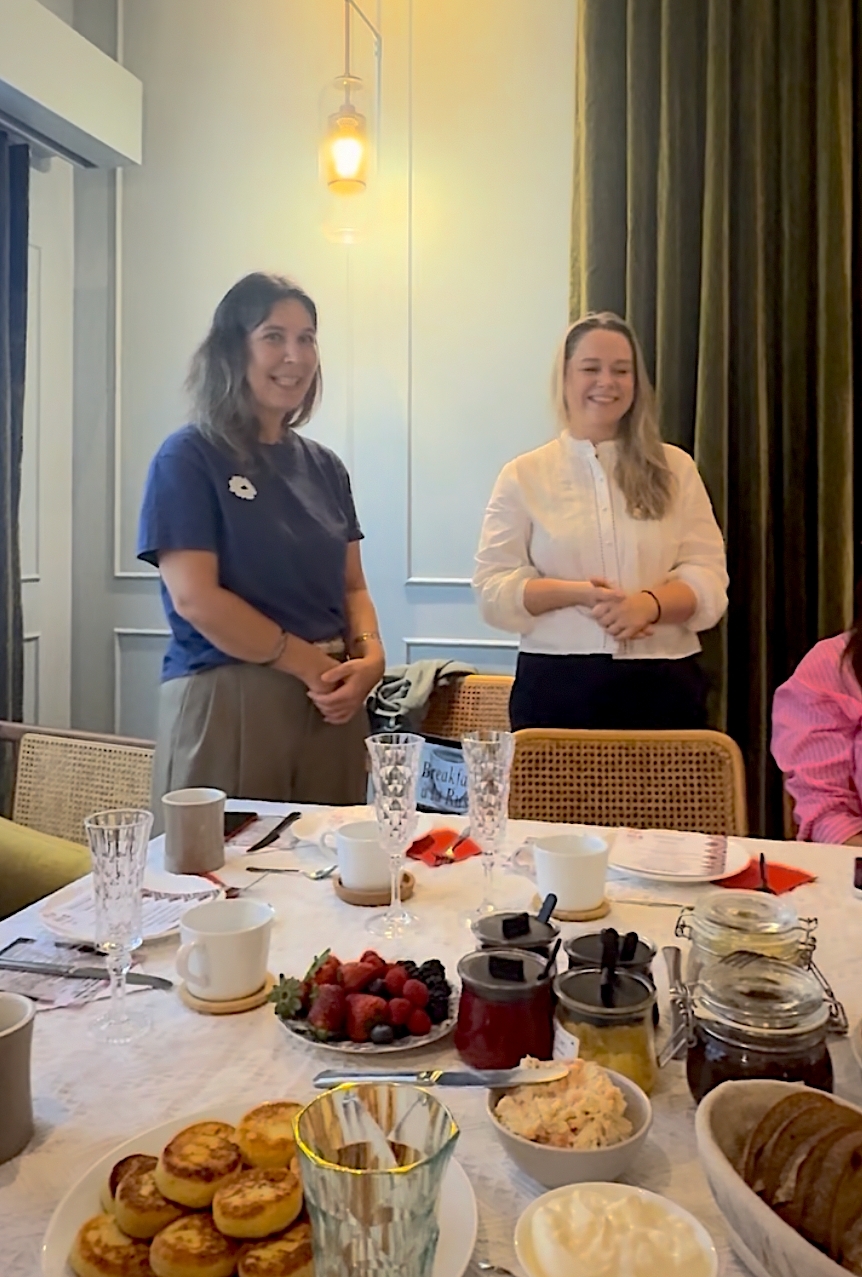
Suxareva's Morning Club serves as a delicate engine of diplomacy. Here, Russian women—artists, entrepreneurs, and teachers gather with local businesspeople. The goal is to build a foundation of cultural understanding and appreciation that fosters sustainable business growth across various sectors, including food imports, art, and education.
Suxareva aims to recreate culinary memories around the table, allowing overseas Russians to feel a sense of belonging. The Club's Instagram provides a platform for them to reconnect through social media and share their memories. She doesn't just cook and serve food; she invites her local guests in Hong Kong to shift perceptions from vodka and spies to creativity and collaboration, and how breaking bread is helping break business barriers.
